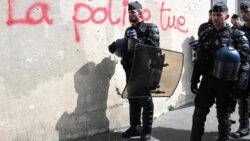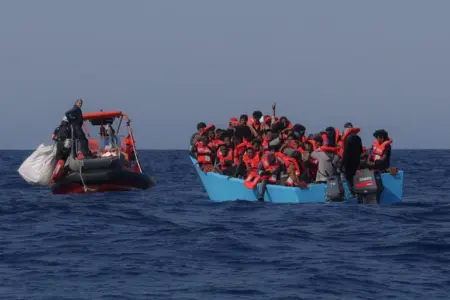French authorities confirmed that a protest against police violence set to take place in Paris on Saturday could not go ahead due to police shortages. NGOs say the ban signals a “more and more repressive” approach from authorities.
Judges from Paris‘s administrative court at midday on Saturday rejected an appeal brought by a national organisation against police violence (la Coordination nationale contre les violences polici?res) to allow Saturday’s demonstration to go ahead at Place de la R?publique in the French capital from 3:00pm.
The ruling followed an announcement from Interior Minister G?rald Darmanin on Wednesday banning any demonstrations up to July 15 “directly linked to the riots” that followed the death of 17-year-old Nahel M., who was shot and killed by police on June 27 in the Paris suburb of Nanterre following a police traffic stop.
France was wracked by almost a week of violent demonstrations against police violence after the teenager was killed.
Paris Police Chief Laurent Nunez had said on Thursday that Saturday’s protest could not go ahead due to a risk of “disturbance to public order”.
Nunez cited a lack of police available to ensure security at the event, after security forces were “strongly mobilized” during the riots and France’s annual July 14 Bastille Day celebrations.
NGOs, unions and left-wing parties reacted to the ban with anger.
“The police headquarters supported by judges from Paris’s administrative court are blocking all channels for the democratic expression of perfectly legitimate demands,” said Lucie Simon, a lawyer representing the organisers of Saturday’s protest.
Following the court’s ruling, the organisers cancelled the event hours before it was scheduled to go ahead.
Around 15 law enforcement vehicles were still present at Place de la R?publique in anticipation of demonstrators, AFP journalists reported.
Pierre Brunisso, from French NGO the Human Rights League, said the situation in France was becoming “more and more repressive” with protesters increasingly feeling they need to be granted “permission” to demonstrate from the police prefecture.
Speaking to the administrative court on Saturday morning, a representative from the police headquarters said the problem was “not the subject of the demonstration but the possibility that violent individuals” would attend.
He also cited the “low availability” of police to work at the event after a large-scale mobilisation of security forces on Thursday and Friday to monitor July 14 celebrations and during the nights of violent protests that followed the killing of Nahel M.
Some 10,000 police and gendarmes who worked on Thursday and Friday in Paris and in the inner suburbs are now on leave, meaning only “five units” are available over the weekend, an official from the public order and traffic department (DOPC) said.
The capital’s police chief also banned a march in the Paris suburb of Val-d’Oise last week to honour the memory of Adama Traor?, who died shortly after his arrest by gendarmes in July 2016.
Police forces said they did not have enough staff to ensure security at the event.
“The police are exhausted,” Nunez said at a hearing at the administrative court, which approved the ban.
That march was banned for a second time after organisers moved the location to Place de la R?publique in Paris. Some 2,000 people gathered there anyway on July 8.
(FRANCE 24 with AFP)





